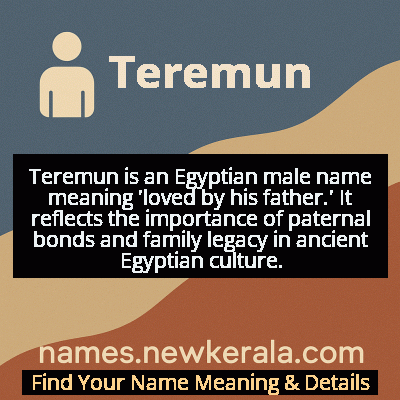Teremun Name Meaning & Details
Origin, Popularity, Numerology Analysis & Name Meaning of Teremun
Discover the origin, meaning, and cultural significance of the name TEREMUN. Delve into its historical roots and explore the lasting impact it has had on communities and traditions.
Name
Teremun
Gender
Male
Origin
Egyptian
Lucky Number
6
Meaning of the Name - Teremun
Teremun is an Egyptian male name meaning 'loved by his father.' It reflects the importance of paternal bonds and family legacy in ancient Egyptian culture.
Teremun - Complete Numerology Analysis
Your Numerology Number
Based on Pythagorean Numerology System
Ruling Planet
Venus
Positive Nature
Harmonious, responsible, caring, and artistic.
Negative Traits
Overly idealistic, superficial, possessive, or jealous.
Lucky Colours
Pink, turquoise.
Lucky Days
Friday.
Lucky Stones
Diamond, turquoise.
Harmony Numbers
2, 3, 9.
Best Suited Professions
Artists, musicians, teachers, healthcare workers.
What People Like About You
Warmth, nurturing nature, artistic flair.
Famous People Named Teremun
Teremun I
Ancient Egyptian Noble
Royal scribe and advisor to Pharaoh Thutmose III, known for his diplomatic missions to Nubia
Teremun of Memphis
High Priest
Oversaw temple renovations at Karnak and established educational institutions for scribes
Teremun the Builder
Architect
Designed several temple complexes in Upper Egypt incorporating Greek and Egyptian architectural styles
Name Variations & International Equivalents
Click on blue names to explore their detailed meanings. Gray names with will be available soon.
Cultural & Historical Significance
During the New Kingdom period, names expressing paternal relationships became increasingly popular as Egyptian society placed greater emphasis on documented genealogies and inherited positions. Teremun often appeared in administrative records and temple inscriptions, suggesting its bearers typically held positions of trust and responsibility. The name's persistence through various dynasties indicates its enduring cultural resonance, representing ideals of filial piety, inherited wisdom, and the sacred bond between generations that formed the bedrock of Egyptian social structure.
Extended Personality Analysis
Individuals named Teremun are typically characterized by a strong sense of loyalty, responsibility, and deep-rooted connection to family traditions. They often exhibit natural leadership qualities combined with a thoughtful, analytical approach to problem-solving, reflecting the name's association with paternal wisdom and guidance. These individuals tend to be reliable, methodical, and possess a quiet confidence that inspires trust in others, much like the dependable nature implied by being 'loved by his father' in the stable, hierarchical structure of ancient Egyptian society.
Their personality often includes a blend of traditional values and innovative thinking, allowing them to honor heritage while adapting to modern circumstances. Teremuns typically demonstrate excellent organizational skills and a protective nature toward those they consider part of their 'extended family' or community. They may struggle with being overly self-critical or carrying excessive responsibility, but their inherent sense of duty and strong moral compass usually guides them toward balanced decisions. The name suggests someone who values knowledge, respects authority while thinking independently, and maintains deep, lasting relationships built on mutual trust and respect.
Modern Usage & Popularity
In contemporary times, Teremun remains a rare but meaningful choice, primarily among families with Egyptian heritage or those fascinated by ancient civilizations. The name has seen a slight resurgence in popularity among academic families and those interested in reviving classical names with deep historical roots. While not appearing on mainstream baby name charts, it maintains a niche appeal in multicultural urban centers and among communities valuing unique names with significant cultural background. Modern usage often adapts the name for international contexts while preserving its Egyptian essence, with parents choosing it to honor both family traditions and the values of paternal love and wisdom it represents.
Symbolic & Spiritual Meanings
Symbolically, Teremun represents the enduring power of paternal bonds, the transmission of wisdom across generations, and the stability of family legacy. The name carries connotations of reliability, trustworthiness, and the sacred responsibility of preserving cultural heritage. It symbolizes the bridge between past and future, embodying the idea that love and knowledge passed from father to son create unbreakable chains of tradition and identity. In metaphorical terms, Teremun suggests groundedness, deep roots, and the quiet strength that comes from knowing one's place in a larger historical and familial narrative.

